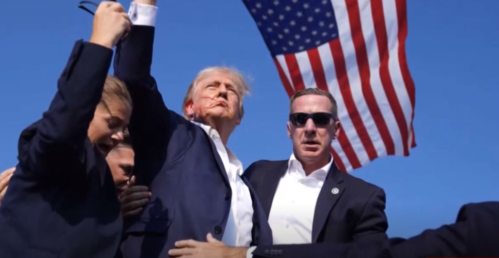The U.S. Secret Service has acknowledged significant lapses in security during the attempted assassination of former President Donald Trump at a Butler, Pennsylvania rally two months ago. A recent internal review, spearheaded by acting Director Ronald Rowe, revealed that a combination of poor planning and communication breakdowns led to the shooting incident that occurred on July 13. One rally attendee was killed, and two others were injured when a gunman fired from a nearby rooftop, grazing Trump and raising serious concerns about the adequacy of his protection.
In a Friday press briefing, Rowe addressed the agency’s interim report, pointing to “complacency” on the part of some agents. A crucial factor identified was the use of separate radio frequencies by local law enforcement and the Secret Service, leaving Trump’s security team in the dark about a suspicious person who had been spotted. “Had our agents been aware of this,” Rowe admitted, “Trump could have been moved to a safer location.” This glaring communication failure has prompted a comprehensive review of Secret Service protocols.
Security Failures in the Lead-Up to the July 13 , Trump Assassination Attempts
The internal investigation revealed a series of security oversights, most notably the failure to secure the building from which the shooter fired. The gunman, identified later as Thomas Matthew Crooks, had clear access to the rooftop and a direct line of sight to the stage where Trump was delivering his speech. According to the report, while line-of-sight issues were acknowledged by field officers, these concerns were neither escalated to supervisors nor addressed before the event.
Additionally, the report highlighted the absence of a coordinated access control strategy. This allowed the shooter to position himself without resistance from security forces. Acting Director Rowe emphasized that the Secret Service cannot “defer our responsibilities to others,” suggesting that the agency failed to provide adequate guidance or direction to its local law enforcement partners. The failure to establish a unified communication system between the Secret Service and local authorities was a critical shortcoming that allowed the attack to unfold.
Accountability and Resignations Following the Incident
The aftermath of the July 13 shooting has led to major leadership changes within the Secret Service. The resignation of the previous Secret Service Director was directly tied to the events surrounding the Donald Trump rally attack, and disciplinary actions are now being considered for agents involved in the security failures. Acting Director Rowe stressed the need for the agency to take full responsibility, stating, “This was a failure on the part of the United States Secret Service. It’s important that we hold ourselves accountable for these failures.”
Rowe’s remarks signal the beginning of an accountability phase for the agency, which will focus on identifying the individuals and teams responsible for the lapses in security and taking appropriate corrective action. He further emphasized the need for the Secret Service to undergo a “paradigm shift” to address the heightened threat environment, especially in light of a second apparent assassination attempt involving Trump just last Sunday in Florida.
Strengthening Future Protection Measures for Candidates
As a direct result of the July 13 incident and subsequent reviews, the U.S. House of Representatives took swift action to bolster security for presidential and vice-presidential candidates. On Friday, the House voted unanimously to increase Secret Service protections for candidates, particularly those with heightened security risks like Donald Trump. The bill, which will now move to the Senate, aims to address the gaps identified in the Butler rally shooting.
Acting Director Rowe has called for immediate reforms within the agency, including better collaboration with local law enforcement and the development of a more robust communication infrastructure. The Secret Service is under immense pressure to ensure that incidents like the July 13 shooting are not repeated. “We must use the lessons learned from this failure to ensure that we do not have another breach of this magnitude,” Rowe said, reflecting the urgency for reforms as the 2024 election season intensifies.














